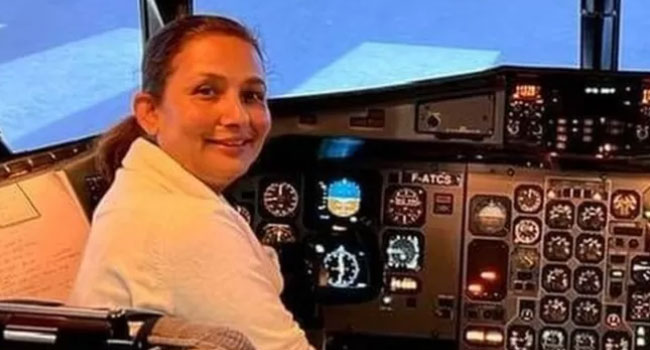Reports have indicated that Anju Khatiwada, the co-pilot of the ill-fated flight that crashed in Nepal on Sunday lost her husband in a plane crash 16 years earlier.
Khatiwada was co-piloting Yeti Airlines flight 691 when it smashed into a gorge near the tourist town of Pokhara, killing all on board in the country’s worst air disaster in 30 years.
READ ALSO: Timeline Of Nepal Air Crashes Since 2010
It was gathered that her husband, Dipak Pokhrel had also been co-piloting a Yeti Airlines flight when he died – and it was his death that spurred Anju to pursue a career in aviation.
Nepali hospital staff began the grim task of handing over bodies to grieving families on Tuesday after a plane with 72 people on board crashed, the country’s worst aviation disaster in three decades.
The Yeti Airlines flight with 68 passengers and four crew plummeted into a steep gorge, smashed into pieces and burst into flames as it approached the central city of Pokhara on Sunday.
All those on board, including six children and 15 foreigners, are believed to have died.
Rescuers have been working almost around the clock extracting human remains from the gorge strewn with twisted plane seats and chunks of fuselage and wing.
Seventy bodies had been retrieved by early Tuesday, police official AK Chhetri told AFP. Another senior official said the day before that the hope of finding anyone alive was “nil”.
“We retrieved one body last night. But it was three pieces. We are not sure whether it’s three bodies or one body. It will be confirmed only after a DNA test,” Chhetri said.
Drones were being used and the search for the two remaining bodies had been expanded to a radius of two to three kilometres (one to two miles), he added.
The black boxes from the plane, made by France-based ATR, were handed over to authorities on Monday, said Bikram Raj Gautam, chief of Pokhara International Airport.
Hospital workers in blue and white protective suits and masks loaded bodies wrapped in plastic onto army trucks on Tuesday as distraught relatives wept and hugged outside.
The trucks then left for the airport, where the bodies would be airlifted back to the capital Kathmandu.
The body of one victim, journalist Tribhuban Poudel, was laid out on a bier covered with orange marigold flowers outside his home as mourners filed past offering prayers in the winter sunshine.
“Eight bodies have been handed to families. We will hand over another 14 bodies after completing autopsies here in Pokhara. Forty-eight bodies have been sent to Kathmandu for DNA tests and handover to the families,” Chhetri said.
Explosion
The ATR 72 was flying from Kathmandu to Pokhara, a gateway for religious pilgrims and trekkers, when it crashed shortly before 11:00 am (0515 GMT).
“I was walking when I heard a loud blast, like a bomb went off,” said witness Arun Tamu, 44, who was around 500 metres (545 yards) away and live-streamed video of the blazing wreckage on social media.
The cause of the crash was not yet known, but a video on social media showed the twin-propeller aircraft banking suddenly and sharply to the left as it neared Pokhara airport. A loud explosion followed.
Experts told AFP it was unclear from the clip whether human error or a mechanical malfunction was to blame.
Experts from the French accident investigation agency were due to arrive in Nepal on Tuesday, the body told AFP.
“We don’t know whether (the crash) was due to any technical fault or reason,” local official Tek Bahadur KC told AFP.
‘In pain’
Raj Dhungana, the uncle of one of the passengers, 23-year-old Sangita Shahi, told AFP outside a hospital in Pokhara that his whole family “is in pain”.
“God has taken away such a nice person,” he said.
According to the Press Trust of India news agency, the pilot Anju Khatiwada joined Nepal’s aviation sector after her husband was killed flying a small passenger plane in 2006.
Poor record
Nepal’s aviation industry has boomed in recent years, carrying goods and people between hard-to-reach areas, as well as ferrying foreign mountain climbers.
The sector has been plagued by poor safety due to insufficient training and maintenance.
The European Union has banned all Nepali carriers from its airspace over safety concerns.
Nepal also has some of the world’s trickiest and most remote runways, flanked by snow-capped peaks with difficult approaches and capricious weather.
Its deadliest aviation accident was in 1992, when all 167 people on a Pakistan International Airlines jet were killed when it crashed on approach to Kathmandu.
AFP

